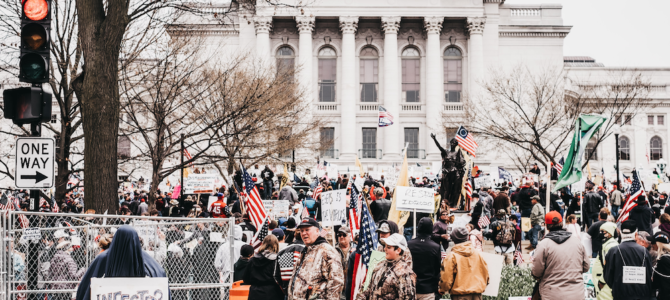
MADISON, Wis. — Wisconsin stay-at-home orders were supposed to expire Friday. Instead, thousands of disgruntled Wisconsinites descended upon the capitol in protest after the Evers administration extended the Dairy State’s so-called Safer at Home order another month.
The Freedom Rally is in full swing in Madison, Wisconsin — @kyleezempel is there with on-the-ground coverage
Watch here: pic.twitter.com/pXjp5ZOU2Q
— The Federalist (@FDRLST) April 24, 2020
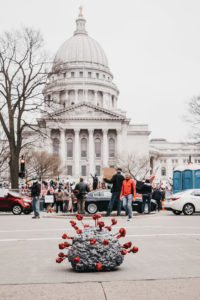 Endless blaring honks turned to white noise as vehicles backed up East Washington Avenue before circling the capitol, with many waving signs and flags out of windows and sun roofs. One man drove a Yukon decked out with Trump 2020 gear, pulling a trailer he had transformed into a “Trump Unity Bridge” and leading passersby in a chorus of “M-A-G-A” to the YMCA song.
Endless blaring honks turned to white noise as vehicles backed up East Washington Avenue before circling the capitol, with many waving signs and flags out of windows and sun roofs. One man drove a Yukon decked out with Trump 2020 gear, pulling a trailer he had transformed into a “Trump Unity Bridge” and leading passersby in a chorus of “M-A-G-A” to the YMCA song.
One man played an audiobook of the Constitution from a boombox in his driver’s window. Somebody navigated a remote-control plastic virus, chasing people around the State Street intersection, and one man tossed out roll after roll of toilet paper, which a nearby woman scurried around to gather.
Some rally attendees donned masks and stuck to the periphery, while others packed in close to one another. Several counter-protesters straggled through — a woman in scrubs held a “Go Home” sign — but they were few.
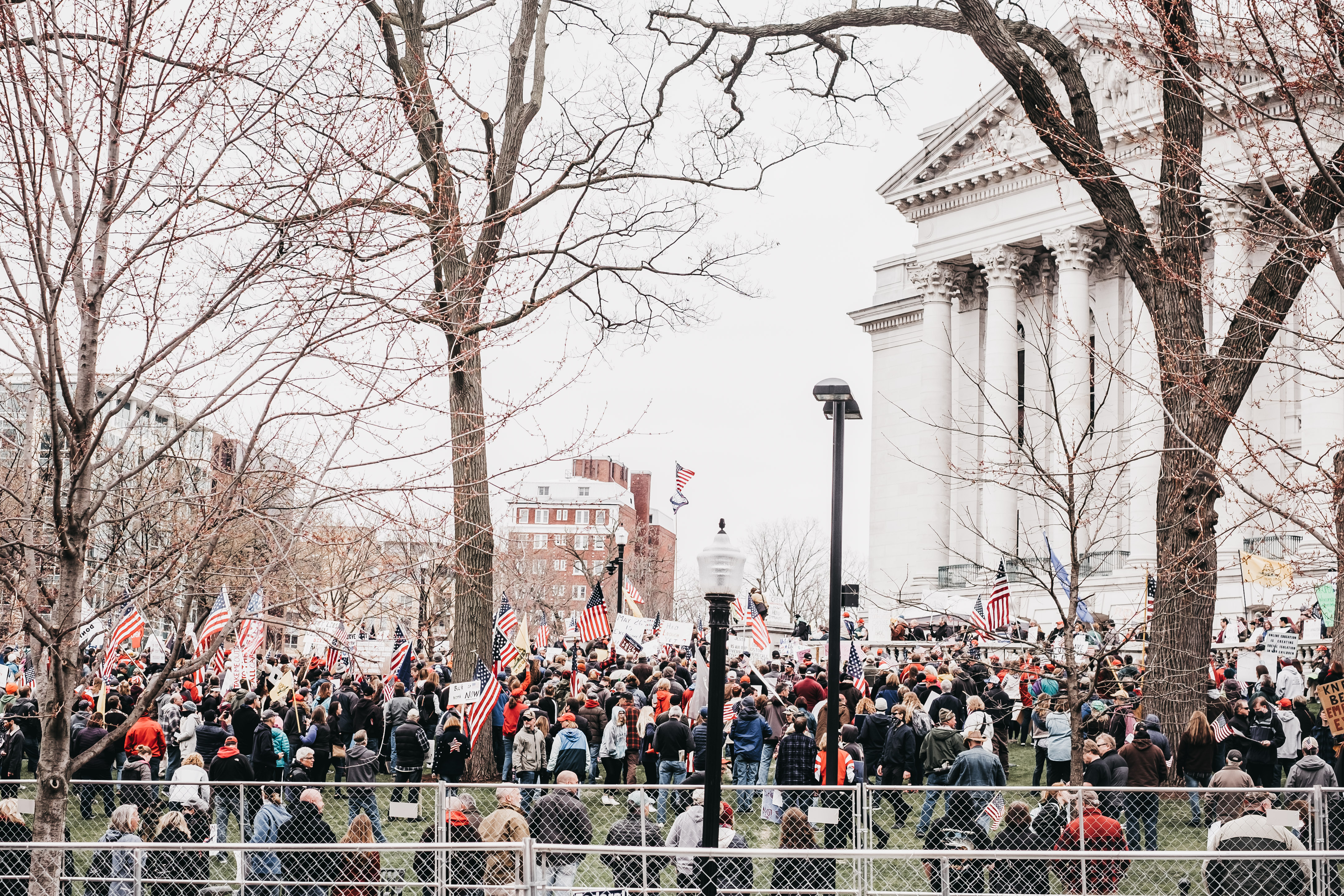
Coronavirus Cases in Wisconsin Aren’t What They Seem
April 16, on joint letterhead with Democratic Gov. Tony Evers, Department of Health Services acting Secretary Andrea Palm unilaterally decided the stay-at-home order would continue through May 26, ensuring schools, many houses of worship, and “nonessential” businesses will remained shuttered for more than another month at least. Republican state lawmakers on Tuesday filed a lawsuit to block the latest order, asking the state Supreme Court to take the case directly, which would bypass lower courts to get a faster ruling.
As of April 20, a total of 5,350 people in Wisconsin have tested positive for the Wuhan coronavirus, with 262 fatalities. Wisconsin has 5.8 million residents, meaning positive cases are 0.09 percent of the state population.
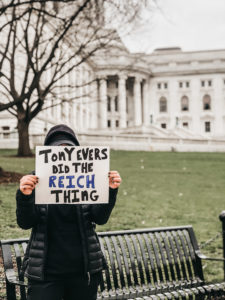 “This isn’t a game. This isn’t funny,” Evers wrote on Facebook. “People die every day because of this virus — often times painful and lonely deaths — and the more we delay or play political games the more people die.” Of the stay-at-home orders, the governor said, “It’s working. We have flattened the curve here in Wisconsin and have prevented the death of at least 300 Wisconsinites, and perhaps as many as 1400 lives.”
“This isn’t a game. This isn’t funny,” Evers wrote on Facebook. “People die every day because of this virus — often times painful and lonely deaths — and the more we delay or play political games the more people die.” Of the stay-at-home orders, the governor said, “It’s working. We have flattened the curve here in Wisconsin and have prevented the death of at least 300 Wisconsinites, and perhaps as many as 1400 lives.”
While Evers cites “flattening the curve” as the impetus for continued shutdowns, statewide data reveals most counties have few-to-no COVID-19 cases. Milwaukee County, the urban hotspot, has seen the greatest outbreak in the state by far, with 154 deaths. From there, the numbers drop off dramatically. Dane, Waukesha, and Racine counties follow with 21, 14, and 10 deaths, respectively. Most other counties in the state show zero or one fatalities.
“Rural counties of our state haven’t seen nearly the number of cases that urban and suburban areas have, yet are bearing the full economic impacts of this crisis,” Republican Scott Fitzgerald, the Senate majority leader, said in a statement.
Many Wisconsinites, especially outside Milwaukee, are tired of the draconian lockdowns. Some are skeptical the shutdowns will end in May after seeing the April deadline so easily extended despite the drastic economic toll. More than 380,000 people have lost their jobs after countless businesses have been deemed “nonessential.”
 “I think that everything that produces a paycheck is essential,” Nanci Valentino of Monroe, a county with only 14 positive cases and zero coronavirus-related deaths, told The Federalist.
“I think that everything that produces a paycheck is essential,” Nanci Valentino of Monroe, a county with only 14 positive cases and zero coronavirus-related deaths, told The Federalist.
“I’ll tell you what irritates me — to be treated like a child, almost like being told to go to your room,” Gerry Holton, a business owner from Delafield in Waukesha County, told The Federalist. “We’re adults. Tell us what the issues are. Tell us what the risk is. Tell us about the virus — I get that. We’re adults. We will adjust. Even with our workers, we give them masks, we give them hand sanitizers, make sure they have it constantly, tell them to keep their distance from each other. … You can’t just shut [businesses] down. It’s wrong.”
“It’s so over-the-top,” his wife Linda added. “And it’s hurting people, little people. It’s got to stop.”
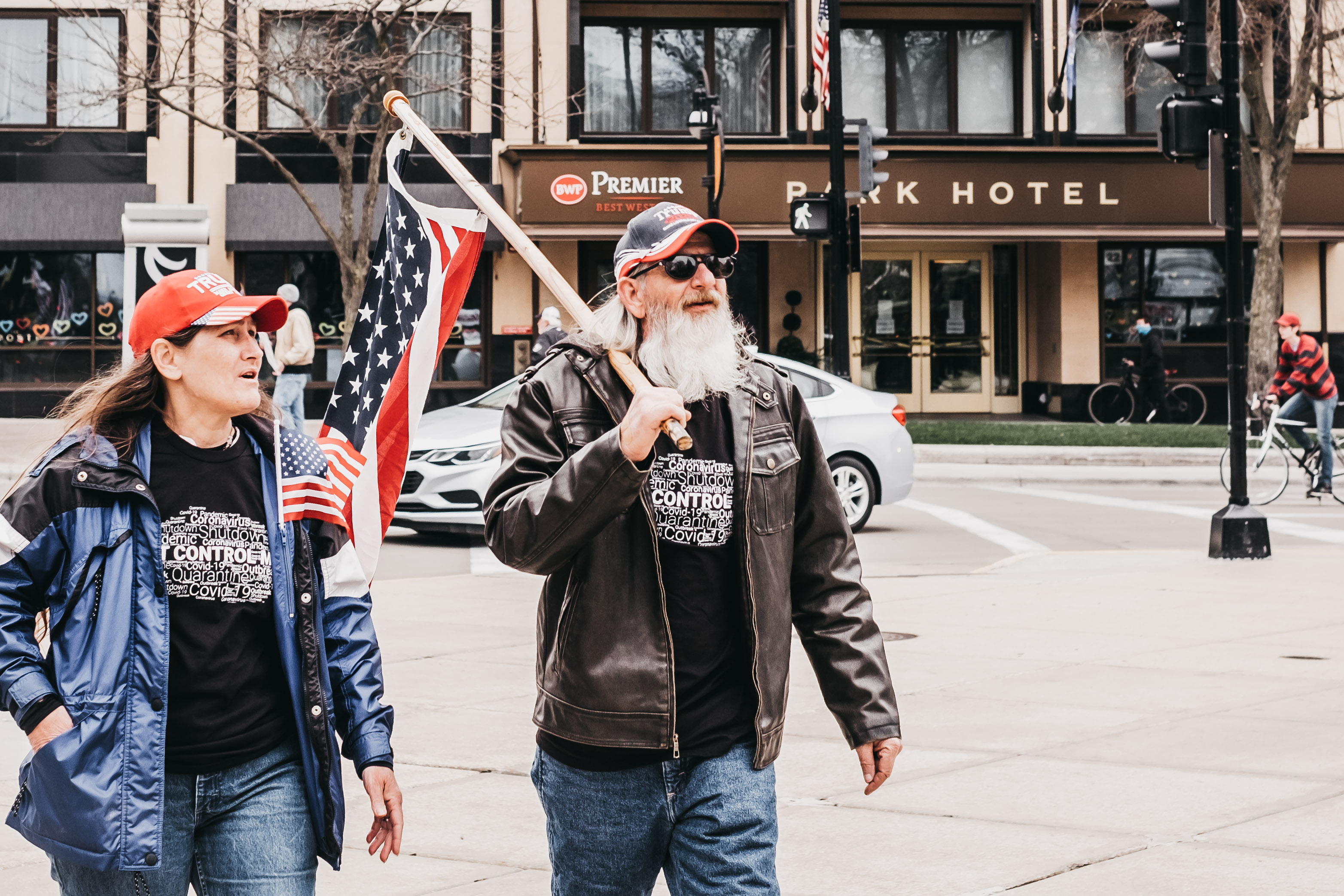
Churches Are Essential
The Freedom Rally also invoked religious themes, with speakers praying and calling for attendees to keep the faith.
Pastor Tim Hallett of Birch Street Baptist Church in Eau Claire told The Federalist how his congregation is adapting to the governor’s order, meeting in the same building for services but spreading throughout the 17 rooms with no more than nine congregants in each. Eau Claire has had 23 confirmed cases of COVID-19 so far, with zero fatalities.
“My desire is to see all churches open back up so that we can start seeing folks come back to church, and be able to hear the gospel and be able to hear a message that will be helpful and encouraging to them,” Hallett said.
This Rally Follows a Train of Abuses
The Wisconsin protest follows a similar rally in Michigan last week, when thousands gathered in Lansing to protest Democratic Gov. Gretchen Whitmer’s sweeping order, under which the “little tyrant” dictated even which items were essential, telling grocery stores which products they could or could not sell. Fruit and vegetable plants and seeds were banned, but lottery tickets made the cut. The use of motorized boats was prohibited, but not boats without a motor.
The Dairy State rally also comes on the heels of other state drama earlier this month when Evers issued an executive order to postpone the Wisconsin election less than 24 hours before polls were scheduled to open, a move the state Supreme Court struck down. While Democrats blamed Republican lawmakers for the election panic, saying the GOP forced voters to choose between their safety amid the pandemic and their constitutional right to vote, the timeline of events suggests Democrats tilted the election in their favor.
Wisconsinites are signaling they’re done playing political games and aren’t buying into the idea that they’re “Safer at Home.”
“To extend [‘Safer at Home’] to the end of May, that’s just wrong,” said Holton. “It’s hurting people.”









